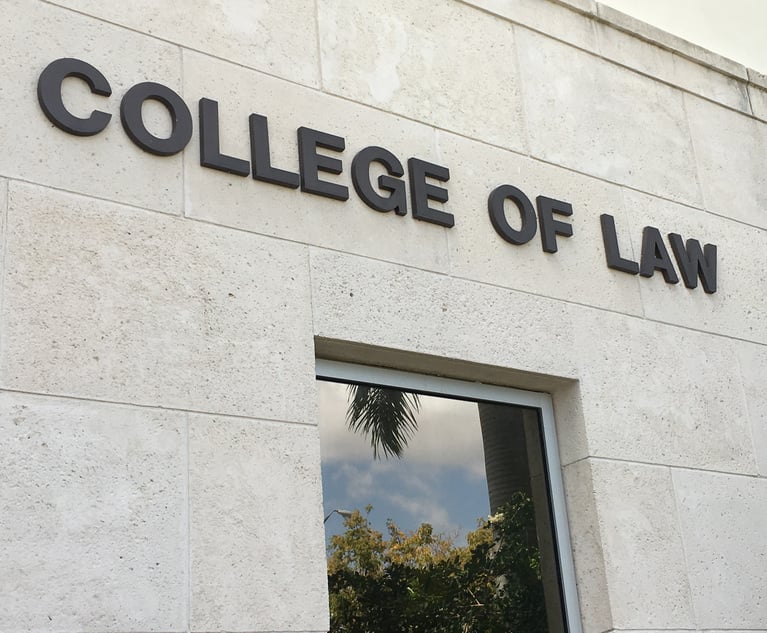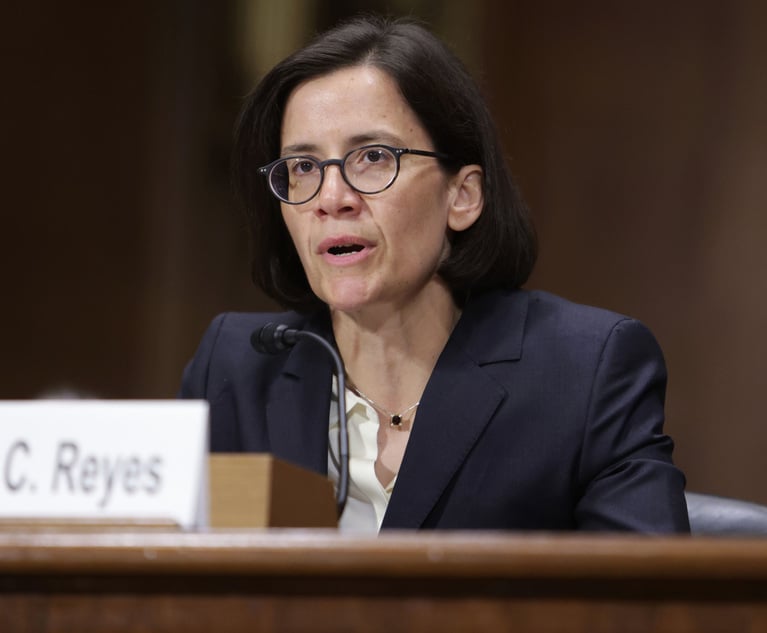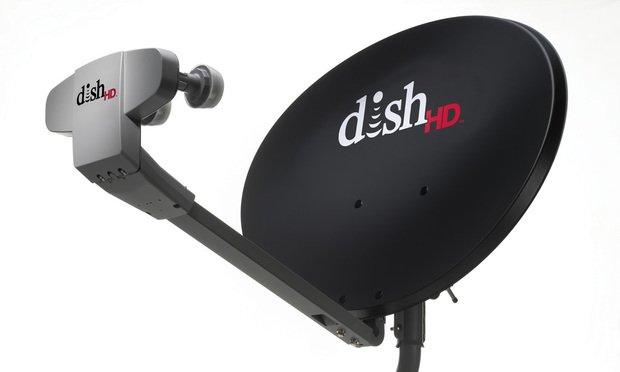Defense Group Urges 4th Circuit to Address Certification of 'Uninjured' Class Members
DRI - The Voice of the Defense Bar wants the appeals court to find that unnamed members in a class action against Dish Network should not have been certified because they did not have the same injuries as lead plaintiffs in the case.
October 15, 2018 at 03:21 PM
5 minute read
A defense bar organization is urging a federal appeals court to find that unnamed members in a class action against Dish Network should not have been certified because they did not have the same injuries as lead plaintiffs in the case.
DRI-The Voice of the Defense Bar, in an amicus brief filed on Oct. 10, urged the U.S. Court of Appeals for the Fourth Circuit to de-certify the class and reverse judgment against Dish Network in a Telephone Consumer Protection Act class action. The group seeks clarity amid scattered case law on a key issue in class actions: whether uninjured class members who are not the named plaintiffs have standing under Article III of the U.S. Constitution.
“There are some courts that have said that you can't have class certification for proposed classes where some of the putative unnamed class members are not injured,” said Felix Shafir of Horvitz & Levy in Burbank, California, who filed the brief for DRI. “And there are other courts that have disagreed with that. There's been a circuit split that's continuing to grow, and it doesn't appear the Fourth Circuit has taken a position on this.”
The Products Liability Advisory Council filed a separate brief in the case in support of Dish Network.
Dish Network filed its opening brief on Oct. 4 after U.S. District Judge Catherine Eagles of the Middle District of North Carolina issued a $61.3 million final judgment against it. Eagles had earlier granted certification of the case, which alleged that Dish, through marketing company Satellite Systems Network, illegally made several telemarketing sales calls to plaintiff Thomas Krakauer, whose phone number was on the Do Not Call Registry. The complaint sought statutory damages of at least $500 per call, which the TCPA allows for individuals who receive “more than one telephone call within any 12-month period” by the same company.
In 2017, a jury sided with the plaintiff, awarding $400 per telephone call, which Eagles trebled for “willful or knowing violations” of the TCPA. The judge noted that Dish had agreed in 2009 with 46 attorneys general to monitor its telemarketers, including SSN. “The evidence shows that Dish's TCPA compliance policy was decidedly two-faced,” she wrote.
In its appeal, Dish argued the class included members who were not telephone subscribers as described under the TCPA. Instead, Eagles certified a class of anyone “associated with” a phone number that SSN called.
“That impermissibly broad class definition encompasses au pairs, former boyfriends, and children who have long since moved away—indeed, potentially anyone ever linked to the phone number,” wrote Dish attorney Eric Shumsky, a partner at Orrick, Herrington & Sutcliffe in Washington D.C.
Shumsky did not respond to a request for comment.
Krakauer's attorney, John Barrett of Bailey & Glasser, said in an email, “The amicis' briefs presented one side of the story. When all sides are presented, as they will be when we file our brief, the issues will look very different, and we believe the district court's rulings will be affirmed.”
Shafir, DRI's attorney, said other appellate courts have split on the issue of whether unnamed class members need to have the same injuries as class representatives. The U.S. Court of Appeals for the Eighth Circuit, in its 2013 decision in Halvorson v. Auto-Owners Insurance, and the Second Circuit, in its 2006 ruling in Denney v. Deutsche Bank AG, have found that judges can't certify classes that include uninjured class members, he said. But other courts, like the First Circuit's In re Nexium Antitrust Litigation decision in 2015, found that classes could be certified so long as the uninjured members are “de minimis.”
“The courts are really all over the place on these issues,” Shafir said.
The Third Circuit, in a 2015 decision in Neale v. Volvo Cars of North America LLC, ruled that only the lead plaintiffs need to have standing, he said, and the U.S. Supreme Court has yet to address the issue directly.
“What the Supreme Court previously indicated is if you have variations of injury between the named plaintiff and unnamed class members, that would be a problem from a constitutional standing requirement and, in some cases, the court has indicated that goes to class certification,” he said. “In other cases, the court has dealt with it in other ways. The Supreme Court has recognized the case law in this area is a little bit of a mess, but has not been entirely consistent with how it dealt with that issue.”
The Products Liability Advisory Council, in its amicus brief, addressed a different issue: Whether Dish was vicariously liable for the actions of SSN, a “third party independent marketing company.” In its opening brief, Dish also argued that it lacked complete control over SSN.
PLAC made a similar argument in an amicus brief before the Seventh Circuit in a case brought by the Federal Trade Commission. In that case, a federal judge last year ordered Dish to pay $200 million to the FTC and four states: California, Illinois, North Carolina and Ohio. U.S. District Judge Sue Myerscough of the Central District of Illinois found that Dish, through independent contractors, violated state and federal “Do Not Call” regulations.
The Seventh Circuit heard oral arguments in that case on Sept. 17.
This content has been archived. It is available through our partners, LexisNexis® and Bloomberg Law.
To view this content, please continue to their sites.
Not a Lexis Subscriber?
Subscribe Now
Not a Bloomberg Law Subscriber?
Subscribe Now
NOT FOR REPRINT
© 2025 ALM Global, LLC, All Rights Reserved. Request academic re-use from www.copyright.com. All other uses, submit a request to [email protected]. For more information visit Asset & Logo Licensing.
You Might Like
View All
Justified Termination Does Not Bar Associate Attorney From Unemployment Benefits, State Appellate Court Rules
5 minute read
Florida Law Schools Are Seeing a Bump in Applications for 2025, After Recent Declines at Flagship Schools
3 minute read
Federal Judge Warns of 'Serious Sanctions' on FDIC Over Document Retention
3 minute read
Hogan Lovells, Jenner & Block Challenge Trump EOs Impacting Gender-Affirming Care
3 minute readTrending Stories
- 1January Petitions Press High Court on Guns, Birth Certificate Sex Classifications
- 2'A Waste of Your Time': Practice Tips From Judges in the Oakland Federal Courthouse
- 3Judge Extends Tom Girardi's Time in Prison Medical Facility to Feb. 20
- 4Supreme Court Denies Trump's Request to Pause Pending Environmental Cases
- 5‘Blitzkrieg of Lawlessness’: Environmental Lawyers Decry EPA Spending Freeze
Who Got The Work
J. Brugh Lower of Gibbons has entered an appearance for industrial equipment supplier Devco Corporation in a pending trademark infringement lawsuit. The suit, accusing the defendant of selling knock-off Graco products, was filed Dec. 18 in New Jersey District Court by Rivkin Radler on behalf of Graco Inc. and Graco Minnesota. The case, assigned to U.S. District Judge Zahid N. Quraishi, is 3:24-cv-11294, Graco Inc. et al v. Devco Corporation.
Who Got The Work
Rebecca Maller-Stein and Kent A. Yalowitz of Arnold & Porter Kaye Scholer have entered their appearances for Hanaco Venture Capital and its executives, Lior Prosor and David Frankel, in a pending securities lawsuit. The action, filed on Dec. 24 in New York Southern District Court by Zell, Aron & Co. on behalf of Goldeneye Advisors, accuses the defendants of negligently and fraudulently managing the plaintiff's $1 million investment. The case, assigned to U.S. District Judge Vernon S. Broderick, is 1:24-cv-09918, Goldeneye Advisors, LLC v. Hanaco Venture Capital, Ltd. et al.
Who Got The Work
Attorneys from A&O Shearman has stepped in as defense counsel for Toronto-Dominion Bank and other defendants in a pending securities class action. The suit, filed Dec. 11 in New York Southern District Court by Bleichmar Fonti & Auld, accuses the defendants of concealing the bank's 'pervasive' deficiencies in regards to its compliance with the Bank Secrecy Act and the quality of its anti-money laundering controls. The case, assigned to U.S. District Judge Arun Subramanian, is 1:24-cv-09445, Gonzalez v. The Toronto-Dominion Bank et al.
Who Got The Work
Crown Castle International, a Pennsylvania company providing shared communications infrastructure, has turned to Luke D. Wolf of Gordon Rees Scully Mansukhani to fend off a pending breach-of-contract lawsuit. The court action, filed Nov. 25 in Michigan Eastern District Court by Hooper Hathaway PC on behalf of The Town Residences LLC, accuses Crown Castle of failing to transfer approximately $30,000 in utility payments from T-Mobile in breach of a roof-top lease and assignment agreement. The case, assigned to U.S. District Judge Susan K. Declercq, is 2:24-cv-13131, The Town Residences LLC v. T-Mobile US, Inc. et al.
Who Got The Work
Wilfred P. Coronato and Daniel M. Schwartz of McCarter & English have stepped in as defense counsel to Electrolux Home Products Inc. in a pending product liability lawsuit. The court action, filed Nov. 26 in New York Eastern District Court by Poulos Lopiccolo PC and Nagel Rice LLP on behalf of David Stern, alleges that the defendant's refrigerators’ drawers and shelving repeatedly break and fall apart within months after purchase. The case, assigned to U.S. District Judge Joan M. Azrack, is 2:24-cv-08204, Stern v. Electrolux Home Products, Inc.
Featured Firms
Law Offices of Gary Martin Hays & Associates, P.C.
(470) 294-1674
Law Offices of Mark E. Salomone
(857) 444-6468
Smith & Hassler
(713) 739-1250









